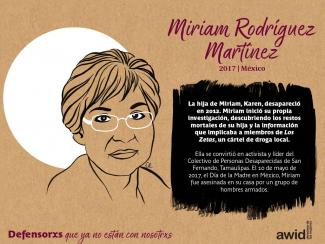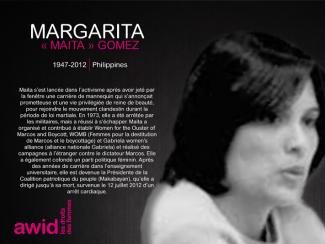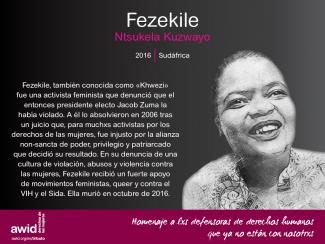
Fezekile Ntsukela Kuzwayo

WHRDs are self-identified women and lesbian, bisexual, transgender, queer and intersex (LBTQI) people and others who defend rights and are subject to gender-specific risks and threats due to their human rights work and/or as a direct consequence of their gender identity or sexual orientation.
WHRDs are subject to systematic violence and discrimination due to their identities and unyielding struggles for rights, equality and justice.
The WHRD Program collaborates with international and regional partners as well as the AWID membership to raise awareness about these risks and threats, advocate for feminist and holistic measures of protection and safety, and actively promote a culture of self-care and collective well being in our movements.
WHRDs are exposed to the same types of risks that all other defenders who defend human rights, communities, and the environment face. However, they are also exposed to gender-based violence and gender-specific risks because they challenge existing gender norms within their communities and societies.
We work collaboratively with international and regional networks and our membership
We aim to contribute to a safer world for WHRDs, their families and communities. We believe that action for rights and justice should not put WHRDs at risk; it should be appreciated and celebrated.
Promoting collaboration and coordination among human rights and women’s rights organizations at the international level to strengthen responses concerning safety and wellbeing of WHRDs.
Supporting regional networks of WHRDs and their organizations, such as the Mesoamerican Initiative for WHRDs and the WHRD Middle East and North Africa Coalition, in promoting and strengthening collective action for protection - emphasizing the establishment of solidarity and protection networks, the promotion of self-care, and advocacy and mobilization for the safety of WHRDs;
Increasing the visibility and recognition of WHRDs and their struggles, as well as the risks that they encounter by documenting the attacks that they face, and researching, producing, and disseminating information on their struggles, strategies, and challenges:
Mobilizing urgent responses of international solidarity for WHRDs at risk through our international and regional networks, and our active membership.

La tasséomancie est une méthode de divination qui interprète les motifs dans les feuilles de thé et/ou le marc de café. Il s’agit d’une pratique qui se transmet par les femmes de mon côté arménien et qui m’a été enseignée par ma mère, qui elle-même l’a apprise de sa mère, et ainsi de suite. Lorsque je regardais ma grand-mère lire le marc de café du café arménien préparé pour la famille et les amis, je remarquais que, souvent, elle voyait ce qu'elle avait envie de dire. Ces gravures disent certaines des choses que j’ai envie de voir dans le monde ; j'espère que vous aussi.

Cette gravure célèbre la résilience, le sacrifice et la force des combattant·e·s de la liberté de l’Asie du Sud-Ouest et de l’Afrique du Nord à travers l'histoire et la solidarité qui existe. Elle a été inspirée à l'origine par un article que j'ai lu sur une exposition organisée à Tatvan, un district de Bitlis, qui mettait en lumière la présence arménienne dans la région. Mes ancêtres sont originaires de Bitlis, se situant aujourd'hui sur le territoire de la Turquie actuelle.

La tasséomancie (la lecture du marc de café) est une pratique culturelle utilisée par les femmes arméniennes depuis des siècles pour se parler entre elles et les unes aux autres, un langage codé permettant d'entamer des conversations, d'établir des relations et de tisser des liens.
![]Ali Chavez Leeds portrait](/sites/default/files/styles/max_325x325/public/2021-10/portrait.jpeg?itok=0yU3PqLe)
We work towards a world based on social, environmental, and economic justice; and interdependence, solidarity, and respect. We work towards dismantling systems of oppressive power and against all its manifestations, including patriarchy, fundamentalisms, militarisms, fascisms and corporate power that threaten our lives and our world. We want a just world where resources and power are shared in ways that enable everyone to thrive.


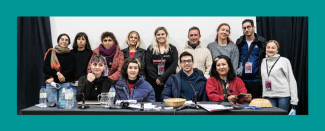
by Esra Ozban
In a product-obsessed world, prioritizing process is a fundamental feminist method. Processes matter, and curation is no exception. While figuring out which of the films from the SWANA region would speak the loudest to the Feminist Realities theme, the global pandemic we are still facing shifted our everyday lives tremendously. Even to think, write, or express myself has become an everyday struggle. I kept missing all of my deadlines and sending apology emails to Kamee Abrahamian, whom I was working with as an independent curator for AWID’s Feminist Film Club. Kamee’s invaluable support, understanding, and suggestions reminded me that even in two different parts of the world, as colleagues who never met in person, we can co-create micro versions of the Feminist Realities for which we live and yearn.
Feminist Realities for me have a lot to do with sisterhoods. Sisterhoods that help womxn clearing mines in Artsakh/Nagorno-Karabakh. Sisterhoods baked in Vegan Inclusive Trans Cake by young trans feminists in Ankara that remind cis-ters that they are not welcomed by the Z generation. Sisterhoods that are growing into the mint on Dragica Alafandi’s rooftop in the Dheisheh Refugee Camp in Occupied Palestine in Sowing seeds of resistance. Sisterhoods that embrace intimate, sexual, and revolutionary proximities in Gezi Park in #resistayol. Sisterhoods that unearth an imagined encounter between two generations of womxn in exile in the streets of Haifa in Your father was born 100 years old and so was the Nakba. Cross-species sisterhoods that build in a fictional (brave) space created by Mounia Akl in Submarine for her rebel character Hala, who refuses to evacuate from a city full of garbage and is left behind with a dog friend.
This selection gathers bits and pieces of many Feminist Realities that have been realized in the SWANA region over the last couple of years. We will continue to imagine, learn, and share feminist embodiments of hope and power. In the meantime, let’s immerse ourselves in the powerful alternatives brought to life by the filmmakers and protagonists of these films. We may co-create every step, every act, and every attempt as we continue to cohabitate this world with others who are living Feminist Realities and continue to dream more of them into existence.
By Emily Mkrtichian& Jesse Soursourian
“With beautiful visuals paired with compelling verité scenes, Motherland is a show of female camaraderie and strength… The film is a testament of women around the world who are willing to work harder to overcome any obstacle they meet.”
- Nosarieme Garrick, award winning filmmaker
“Motherland is an inspiring visualization of solidarity, courage, and grit…”
- Hers is Ours Collective, organizers of the Outsider Moving Art & Film Festival
Motherland from jesse soursourian on Vimeo.
Emily Mkrtichian on Feminist Realities and Artsakh/NKR:
We shot the short film, Motherland, in the Republic of Artsakh in 2018. I was drawn to each of these women for their strength, their resilience and their humor -- despite the context in which they lived. In 2018, that context was the aftermath of a brutal war in the 1990’s, after which their country remained an unrecognized (or, in the international community, disputed) territory that was not given the autonomy and independence so many other countries enjoy. Artsakh was also deeply affected by the consequences we see in almost all places that go through violent conflict -- consequences that so often fall on women to bear: PTSD, high rates of alcoholism, high rates of domestic abuse, less equality and freedoms granted to women, little to no representation of women in politics and civil service. In the face of all these challenges, this film tries to capture the fire and power of the women of Artsakh, one that might not fit the traditional Western feminist paradigm, but one they have created for themselves through deep community ties, care for their families, hard work, and the ability to laugh with eachother through it all. Today, the Republic of Artsakh has been newly devastated by another war that left it without 70% of the lands these women grew up understanding were theirs. Yet, I can promise you that these women, and thousands of others, continue to pull their families, communities, and culture together through the same networks of care, commitment to hard work, and deep riotous laughter in the face of an uncertain future.
By Baladi-Rooted Resistance
“A timely film to watch after having born witness to the latest bombardment of Gaza by Israeli Defence Forces. A glimpse into the way that women in Palestinian communities survive structural oppression, through the story of a library of traditional seeds.. and the women that sustain them as a form of nourishing rebellion.”
- Jessica Horn, PanAfrican feminst strategist, writer and co-creator of the temple of her skin
“Watching women coming together and working collectively for food autonomy is both therapeutic and empowering for me.”
- Hers is Ours Collective, organizers of the Outsider Moving Art & Film Festival
Baladi-Rooted Resistance Team on Feminist Realities:
How to talk about Feminist Realities when you live in Deheisheh, a Palestinian refugee camp, built 70 years ago to serve 3000 refugees, but now home to 15000 people, in the occupied West Bank? Or when the land you farm is under constant threat by illegal settlers.
If you’re a woman in occupied Palestine you will have to struggle not only against patriarchy but also against colonialism and a brutal military occupation.
Dragiča and Vivien are fighting these multiple systems of domination in their own way.
Vivien uses native seeds to help Palestinians maintain their identity. Growing traditional food in traditional ways has great significance: “If you’re not a producer anymore, you’re a consumer, and what better way to enslave someone than turning them into your consumer. This is happening all around the world, but here you have it doubled with the military occupation.”
31.5% of households in the West Bank are food insecure. Through a rooftop edible garden, Dragiča managed to increase her family’s food autonomy. In the crowded camp, where the Israeli army conducts regular nighttime incursions to arrest and harass residents, Dragiča’s rooftop garden not only nourishes her family, but it especially nourishes her soul.
By Ruzgar Buski
Ruzgar Buski on Feminist Realities:
I don’t know what to say about Feminist Realities but as a trans artist, an activist from Turkey, I know our realities are harsh. We live with violences- physical, emotional, economical, sexual! That is why we have to build our own networks, and co-creating micro realities for each other is a Feminist Reality for me. #resistayol is my first film, and at the beginning I was planning to make a film by/for/with trans people that does not try to convince anyone to the fact that trans people are human or focuses on raising awareness on trans issues. However, Gezi Uprising, one of the biggest uprising in the history of Turkey, happened and the film became something different.
I believe the production process really affects what the film is. We tried very hard for women, trans and non-binary people to work on every step of the film. This film is made by people who gathered with camaraderie and friendship. Kanka Productions is founded on transfeminist comradeship. I want the film to give hope, to heal because we carry a lot of traumas in our bodies- this is what makes us and what bonds us. Healing is a never-ending process and we have to create spaces to breath. #resistayol is an hour of breathing collectively.
Boysan Yakar in #resistayol:
Well lubunyas (queers) were sitting in the park, all of a sudden bulldozers arrived and everyone got pissed off. Actually in summary this is it. It's Lubunya's park,and we had thirty days to explain that to this huge city. Everyone acknowledged that at night ibnes (faggots) fuck in that park...LGBTI Block carried our commune there. We already didn't trust the state and police and didn't have any security, we've established our own ways of doing things, our own laws and customs to survive... We carried our law to Gezi rapidly...With an effort to establish some common language and understanding among all these groups, the LGBT language of togetherness spread all through the park. Every day was a Pride march, everyone was continuously saying ‘ayol’. We spruced up the stinky, fusty language of the left. I guess we had such an impact because we've been disowned for all these years. From the most radical ones to the most conservative and nationalist ones, they all needed us, because everyone got used to being confronted with everything. Τhey were not used to such energy, our energy. That’s why it was a great political space for us. Every day, we actualized our biggest and main struggle there, that is, a struggle for visibility and recognition. That’s why we left Gezi with a huge gain.
By Pembe Hayat
“...a multifaceted statement, showing the joy that exists in the friendships within the queer community in Turkey as a display of rebellion and resistance.”
- Nosarieme Garrick, award winning filmmaker
“...fun, light, and random. In a world constantly marked and scarred by violence against the trans community, nothing, no action, is (unfortunately) deprived of meaning. So to more joy, love, and meaningful randomness!”
- Hers is Ours Collective, organizers of the Outsider Moving Art & Film Festival
Cayan Azadi in Vegan Inclusive Trans Cake:
Hello Barbies, Kens, porcelain dolls, Olive Oyls, cabbage dolls. Brides of Chucky, sisters of Chucky, brother-in-laws of Chucky and last but not least, esteemed brother-in-law lovers.
So why did we make this cake.
Now we got the news that a trans woman sex worker has attempted suicide due to the violence from street-guards and police on the street. She’s being kept at a police station now and that’s exactly why we made this cake. This transvestite cake is baked to show that we exist in every part of life, that we exist persistently and this cake shows that won’t be wiped off or ignored in this society.
Yes, there is violence in our lives, yes there is a lot of shade as well but despite all of that, we can still have fun, enjoying life as much as we can. Bon appetit, sis!
By Razan AlSalah
By Mounia Akl
“It is directed as a poem is written… simple, a touch abstract, and moving.”
- Hers is Ours Collective, organizers of the Outsider Moving Art & Film Festival
Esra Ozban:
Esra Ozban is a film programmer and filmmaker from Turkey. Their artistic, curatorial, and scholarly work intersects critical archival practices, sex work, pornography, feminist/queer film cultures among others.
Este Foro de AWID celebrará y difundirá las realidades feministas que nos rodean en diferentes etapas de desarrollo.
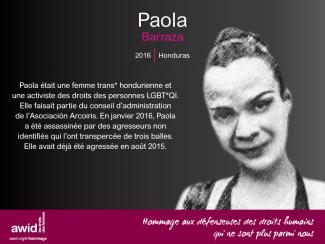
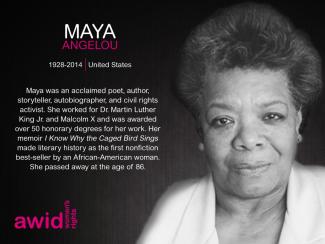
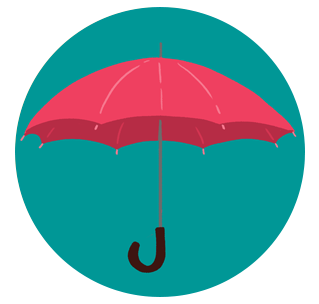
Los discursos anti-derechos continúan evolucionando. Además de utilizar argumentos relacionados con la religión, la cultura y la tradición, los actores antiderechos cooptan el lenguaje de la justicia social y los derechos humanos para ocultar sus verdaderas agendas y ganar legitimidad.

Hace tres décadas, un evangelista televisivo estadounidense candidato del Partido Republicano dijo una célebre frase: el feminismo es «un movimiento político antifamilia que alienta a las mujeres a dejar a sus maridos, matar a sus hijos, practicar brujería, destruir el capitalismo y convertirse en lesbianas». Hoy en día, esta idea conspirativa ha logrado un alcance y una legitimidad sin precedentes bajo la forma del discurso de la «ideología de género», un término genérico que, cual enemigo imaginario, ha sido creado por los actores antiderechos para oponerse a él.
Dentro de la serie de discursos empleados por los actores antiderechos (que incluyen nociones de «imperialismo cultural» y «colonización ecológica», apelaciones a la «objeción de conciencia» y la idea de un «genocidio prenatal»), un tema clave es la cooptación. Los actores antiderechos se apropian de problemáticas legítimas, o seleccionan partes de estas, y las distorsionan al servicio de sus agendas opresivas.
Nous tenons à remercier les personnes qui ont contribué à ce projet et qui ont fourni de précieux conseils :
Related Content
Front Line Defenders: Emilsen Manyoma Killed
ReliefWeb: A human rights defender killed every other day in 2017 in Colombia (between 1 and 23 January 2017)
Global Witness: Defenders of the Earth (2016 Report)
okayafrica.: Who is Killing Colombia's Black Human Rights Activists?
PBI Colombia: We will always accompany your work
Bitch Media: Don’t Touch My Crown: The failure of decapitation and the power of black women’s resistance


Listen to this story here:
 |
Hind and Hind fue la primera pareja queer documentada en la historia árabe. En el mundo de hoy, es unx artista queer del Líbano. |

A los seis años, me enteré de que mi abuelo tenía una sala de cine. Mi madre me contó que la había abierto a principios de la década de 1960, cuando ella también tenía unos seis años. Recordaba que la primera noche proyectaron La novicia rebelde / Sonrisas y lágrimas.
Yo pasaba por el cine todos los fines de semana, y miraba a mi abuelo jugar al backgammon con sus amigos. No sabía que él estaba viviendo en la sala, en una habitación que estaba justo debajo de la cabina de proyección. Supe más tarde que se había mudado ahí después de que él y mi abuela se separaran, cuando el cine cerró, en los años 1990, poco después de que terminara la guerra civil en el Líbano.

Durante años, y hasta que él falleció, casi siempre veía a mi abuelo jugando al backgammon en el descuidado vestíbulo del cine. Esas escenas repetidas son todo lo que recuerdo de él. Nunca llegué a conocerlo bien, nunca hablamos de cine, aunque él pasaba todo su tiempo en una sala de cine destartalada. Nunca le pregunté cómo era vivir en un lugar como ese. Murió cuando yo tenía doce años, en Nochebuena, a causa de una caída por la escalera caracol que llevaba a la cabina de proyección. Resulta casi poético que haya fallecido en movimiento, en un edificio donde las imágenes animadas están permanentemente suspendidas en el tiempo.

En la primavera de 2020, mi primo me llamó para decirme que había limpiado el cine de mi abuelo, y me pidió que fuera allí para encontrarme con él. Lxs dos siempre habíamos soñado renovarlo. Llegué antes que él. En el vestíbulo seguían estando los marcos de los afiches de las películas, pero faltaban los afiches. Yo sabía que debían haber quedado talonarios de entradas en algún lado; los encontré apilados en una pequeña caja de latón oxidada, sobre un estante de la boletería, y me guardé algunos.
Empecé a dar vueltas por el cine. En el escenario principal, la pantalla de proyección estaba muy sucia y un poco rota en un costado. Deslicé mi dedo índice sobre la pantalla para quitar una mancha de polvo, y vi que, debajo, la pantalla todavía era blanca. La tela también parecía estar en buenas condiciones. Miré hacia arriba para ver si el telón de mi abuela todavía estaba colocado. Estaba hecho de satén blanco, con un pequeño emblema bordado que representaba al cine. Había una sala principal y una galería de palcos. Los asientos parecían muy desgastados.
Noté que el proyector asomaba por una ventanita al fondo del área de los palcos. Subí los escalones en espiral que llevaban a la cabina de proyección.
La habitación estaba a oscuras, pero un haz de luz, que entraba por las ventanas polvorientas, mostraba un montón de rollos de película arrojados en un rincón. Había cintas de celuloide inertes enredadas contra el pie del proyector. Los rollos polvorientos eran películas de género: westerns, cine de Bollywood y ciencia ficción con títulos malos como El meteorito que destruyó la Tierra o algo por el estilo. Me llamaron la atención las tiras de película polvorientas que, en su mayoría, eran fragmentos recortados de los rollos. Una por una, las tiras cortas mostraban diferentes escenas de besos, algo que parecía ser una danza sugerente, una escena indefinida de una reunión, un primer plano de una mujer acostada con la boca abierta, los créditos de apertura de una película de Bollywood, y una etiqueta de «Ahora en cartelera» que ocupaba varios fotogramas.
Los créditos de la película de Bollywood me recordaron a mi madre. Ella solía contarme que a la salida entregaban al público pañuelos de papel. Me guardé una escena de besos y las tiras de danza sugerente; supuse que habían sido cortadas por motivos de censura. El primer plano de la mujer me hizo pensar en los libros de Béla Balázs Visible Man, or The Culture of Film, The Spirit of Film y Theory of the Film. Él decía que en el cine los primeros planos proporcionan un
soliloquio silencioso, en el que un rostro puede hablar con los más sutiles matices de significado sin parecer antinatural y provocar la distancia de lxs espectadores. En este monólogo silencioso, la solitaria alma humana puede encontrar una lengua más sincera y desinhibida que en cualquier soliloquio hablado, porque habla instintivamente, en forma inconsciente.

Balázs estaba principalmente describiendo los primeros planos de Juana en la película muda La passion de Jeanne d’Arc. Señalaba cómo «... en la [película] muda, la expresión facial, aislada de su entorno, parecía penetrar en una nueva y extraña dimensión del alma».
Examiné más a fondo la tira de la película. La mujer parecía muerta, su cara era casi como una máscara. Me recordó al cuadro Ophelia del pintor John Everett Millais. En su libro Sobre la fotografía, Susan Sontag dice que una fotografía es «un rastro, algo directamente tomado de lo real, como una huella o una máscara mortuoria». Estas máscaras mortuorias son como una presencia que recuerda una ausencia.
Recordé haber encontrado un diálogo entre la muerte y la fotografía en la olvidada película de Roberto Rossellini La macchina ammazzacattivi [La máquina que mata a los malos]. En esta película, un camarógrafo va por ahí tomando fotos de personas, que a su vez se congelan, y luego quedan suspendidas en el tiempo. El crítico francés de cine André Bazin decía que la fotografía arrebata a los cuerpos del flujo de la muerte y los almacena embalsamándolos. Describía esta momificación fotográfica como «la preservación de la vida mediante la representación de la vida».
Esta cabina de proyección, toda su configuración, todas las cosas que parecían haber sido movidas, las tiras de celuloide en el piso, todo aquello en lo que mi abuelo había dejado una marca... sentí que debía protegerlo.
Debajo de las cintas había un rollo de película polvoriento y desarmado. Parecía que alguien había estado mirando el rollo manualmente. En ese momento, mi primo subió por la escalera caracol y me encontró estudiándolo. Se frotó el mentón con los dedos, y en tono muy objetivo dijo —Encontraste el porno.

Miré la tira de película que tenía en la mano, y me di cuenta de que no era una escena de muerte. La cinta había sido cortada del rollo porno. La mujer estaba gimiendo de éxtasis. Los primeros planos sirven para transmitir sentimientos de intensidad, de clímax, pero en realidad yo nunca había usado las teorías de Balázs para describir una escena porno. Él escribió que «el clímax dramático entre dos personas siempre será mostrado como un diálogo de expresiones faciales en primer plano». Me puse la tira de película en el bolsillo, y decidí llamar a la mujer Ishtar. Desde entonces, Ishtar ha vivido siempre en mi billetera. Parecía extraño comparar la minuciosa descripción de los miedos y el coraje de Juana de Arco con la expresión facial de Ishtar en éxtasis.
Según mi primo, el hermano de mi abuelo esperaba hasta que mi abuelo dejaba el cine y, en lugar de cerrar, invitaba a sus amigos para proyecciones privadas fuera de horario. No me pareció gran cosa. Era una práctica común, especialmente durante y después de la guerra civil del Líbano. Después de la guerra, había aparatos de televisión en casi todas las casas libanesas. Incluso recuerdo que había un televisor en mi dormitorio a finales de la década de 1990, cuando yo tenía unos seis años. Me han contado que comprar películas porno en VHS era algo generalizado en esa época. Mohammed Soueid, un escritor y cineasta libanés, me dijo una vez que, entre mediados de la década de 1980 y mediados de la de 1990, los cines solían proyectar tanto películas artísticas como pornográficas, para poder sobrevivir. También he oído que los proyeccionistas cortaban los rollos de porno para hacer diferentes montajes, y así poder proyectar algo distinto cada noche. Con el tiempo, la gente comenzó a quedarse dentro de la comodidad de sus propios hogares para mirar películas en VHS en sus televisores, y el negocio de los cines comenzó a declinar.

Mi primo volvió abajo para revisar un archivo de papeles que había en la oficina.
Yo me quedé en la cabina y empecé a pasar la tira de película entre mis dedos índice y medio, deslizándola hacia arriba con los pulgares y haciendo correr lentamente los fotogramas por mis manos. Alcé la tira contra la ventana polvorienta, y entrecerré los ojos para entender las viñetas monocromas. En esta serie de fotogramas había un primerísimo primer plano de una verga metida en una vagina. La imagen seguía durante varios fotogramas hasta que llegué a un nudo en la película, y me imaginé el resto.


Hank exhibe su erección frente a Veronika, quien está acostada en la cama al lado de un secrétaire imitación Luis XIV. Ella se levanta lentamente, y desliza el fino bretel de su negligé transparente para que le caiga del hombro izquierdo. Hank le desata la bata de velos, la gira, le da unas palmadas en el culo, y la empuja contra el secrétaire. Le mete la verga en el coño repetidamente, mientras la parte trasera del mueble golpea contra la pared empapelada.


Siempre presté atención a la decoración de interiores, desde la vez que mi profesora de Estudios sobre las Mujeres en la Pornografía dijo que los más grandes archivos de pornografía de América del Norte son utilizados, curiosamente, para examinar el amoblado de la clase media de la época. De modo que, mientras Veronika se agacha y es penetrada desde atrás por Hank, una asistente de investigación universitaria bien podría estar tratando de adivinar el diseño de la decoración dorada del secrétaire, o estudiando el relieve rococó de una silla de madera en algún rincón.
Por un momento, la cabina se convirtió en un espacio para la imaginación sexual femenina, desestabilizando un espacio que, de lo contrario, prometía la libertad de la sexualidad masculina. Estaba segura de que solo los hombres podían acceder a las salas de cine que proyectaban películas porno. El rollo de película estaba demasiado enredado como para arreglarlo en una cabina de proyección donde el polvo se había acumulado durante más de una década, así que lo metí en mi bolso de lona y me fui del cine.
No estoy segura de qué es lo que me ocurrió, pero me sentí obligada a conservarlo. Quería sentir la excitación de salvaguardar algo misterioso, algo no ortodoxo. Mientras iba por la calle, mentalmente estaba segura de que la gente sabía que yo estaba escondiendo algo. Me sobrevino un sentimiento de culpa mezclado con placer. Era algo perverso.

Entré en la casa, preocupada por la idea de tener un rollo pornográfico en mi bolsa de lona y por el fluir de los pensamientos que había tenido en el camino. Fui inmediatamente a mi dormitorio. En algún lugar lejano de mi mente, recordé que compartía una pared con la habitación de al lado, que era de Layla. Probablemente ella no estaba en casa, pero la posibilidad de que me oyeran me excitó. Cerré la puerta de mi dormitorio y saqué la tira de la película de Ishtar.
La imaginé con un vestido transparente color verde claro, bailando seductoramente frente a mí, sacudiendo sus caderas hacia los costados y sonriendo con los ojos. Me metí en la cama. Deslicé los dedos dentro de las bragas. Levanté mis caderas. Pasé la mano por mis muslos, hacia abajo, hasta separarlos, y me metí dos dedos. Me tensé, palpando mis diferentes pliegues. Empecé a gemir antes de poder detenerme. Jadeaba y me mecía. Los rayos de sol que entraban por mi ventana me daban besos renuentes sobre la piel. Aguanté la respiración, y mis brazos y mis piernas se estremecieron. Tragué el aliento y me quedé tumbada sobre el colchón.

Cuando era estudiante universitaria, tomé clases de introducción a la cinematografía. La profesora Erika Balsom había programado una proyección de Variety, de Bette Gordon. Estaba entusiasmada por ver la primera película de la productora Christine Vachon, quien después pasó a producir películas que ahora son parte del movimiento del Nuevo Cine Queer. Variety se describía como una película feminista sobre Christine, una mujer que comienza a trabajar en la boletería de un cine porno de Nueva York, llamado The Variety Theater. Christine oye las películas que se proyectan, pero nunca entra a la sala. Con el tiempo, se siente atraída por un cliente habitual, a quien observa atentamente. Lo sigue hasta una tienda de material pornográfico, en donde se aparta y hojea revistas para adultos por primera vez.
El voyeurismo de Christine se muestra de diferentes maneras a lo largo de la película. El guión también estaba plagado de excesos y de monólogos eróticos que podrían ser considerados obscenos o vulgares.
En una escena ambientada en una sala de juegos, ella le lee un texto erótico a su novio. La cámara va y viene entre un primer plano del culo de Mark mientras él juega al pinball, sacudiendo sus caderas hacia adelante y hacia atrás contra la máquina, y un primer plano del rostro de Christine mientras ella recita su monólogo.


«Sky estaba viajando a dedo y lo levantó una mujer en una pick-up. Era de noche tarde y él necesitaba un lugar donde quedarse, de modo que ella le ofreció su casa.
Ella le acompañó a su habitación y le ofreció un trago. Bebieron y hablaron, y decidieron ir a acostarse. Él no podía dormir, por lo que se puso los pantalones y fue por el pasillo hasta la sala de estar. Casi no podía ser visto, pero sí podía ver. La mujer estaba desnuda y extendida sobre la mesita baja, con las piernas colgando. Todo su cuerpo era de un blanco excitante, como si nunca hubiera estado expuesto al sol. Sus pezones eran color rosa brillante, como de fuego, casi de neón. Tenía los labios abiertos. Su largo cabello cobrizo lamía el suelo, los brazos estirados, los dedos cosquilleando el aire. Su cuerpo aceitado era redondo, sin puntas, sin bordes. Deslizándose entre sus senos había una gran serpiente que se curvaba hacia arriba alrededor de uno, y hacia abajo por el otro. La lengua de la serpiente lamía hacia el coño, tan abierto, tan rojo bajo la luz de la lámpara. Excitado y confundido, el hombre volvió a su habitación, y con gran dificultad logró dormirse. A la mañana siguiente, mientras comen frutillas, la mujer le pide que se quede otra noche. Otra vez, él no podía dormir […]»

Cuando tenía veintitrés años, Lynn, la chica del curso de cine con quien estaba saliendo, me sorprendió llevándome a mirar cortos eróticos el Día de San Valentín. El evento tenía lugar en el Mayfair Theater, un viejo cine independiente. La arquitectura del cine recordaba a los nickelodeons de América del Norte, pero con un toque exagerado. Los palcos estaban decorados con figuras de cartón de tamaño real de El monstruo del pantano y Aliens.
Ese año el jurado del festival era la estrella de cine para adultos Kacie May, y el programa consistía en una hora y media de cortometrajes. El contenido iba desde cortos machistas soft-core hasta películas de coprofilia. Miramos algunos minutos de lo que parecía ser porno suave heterosexual. La filmación mostraba a una pareja que empieza a hacer el amor en una sala de estar moderna, y luego pasa al dormitorio. Eran casi todas imágenes de ellxs besándose, tocándose, y haciendo el amor en la posición del misionero. Después, una mujer con cabello castaño corto se subió a la cama en cuatro patas, lamiendo el dorso de su propia mano a pequeños lengüetazos. Maullaba y se arrastraba sobre la despreocupada pareja. Continuaron haciendo el amor. Ella gateó hasta la cocina, levantó con los dientes su cuenco vacío, y lo colocó sobre una almohada. Siguió caminando encima de ellxs hasta el final del corto. Parecía bastante absurdo. Empecé a reírme, pero a Lynn se la veía un poco incómoda. Entonces, miré a nuestra izquierda, y vi a otras personas del público bebiendo cerveza a borbotones y atragantándose con palomitas de maíz mientras se reían como histéricxs. Sus risas ininterrumpidas y sus comentarios en voz bien alta eran lo que en verdad marcaban el tono del festival. Mirar al público resultó más interesante que mirar las películas eróticas. El Mayfair Theater a menudo proyectaba películas de culto, y mirar películas de culto es una experiencia comunitaria.
No es exactamente la forma en que yo me imaginaba al tío de mi madre mirando pornografía en el cine de mi abuelo. Los cines proyectaban abiertamente películas porno en esa época pero yo no podía imaginar eso sucediendo en el pueblo de mi madre. Lo imaginaba mirando la película desde el proyector de la cabina, para poder detener la proyección rápidamente en el caso de tener alguna visita inesperada. Sus amigos se sentaban en el palco del fondo. Nadie podía entrar por ahí a menos que tuviera una llave, así que era seguro. Tenían que pensar en todo. Era un barrio cristiano conservador, y no habrían querido causar problemas. Lo más probable era que estuvieran abrumados por la excitación y la culpa. Las voces de las bromas homoeróticas en voz alta se mezclaban con los audios de gruñidos y gemidos, pero cada pocos minutos se recordaban unos a otros que debían bajar la voz. Se turnaban para controlar las ventanas, asegurándose de que el sonido no fuera lo suficientemente alto como para alarmar a lxs vecinxs. A veces, apagaban el parlante y no había sonido.

En 2019, después de una protesta política, me encontré un puesto de libros en la calle Riad El Solh, cerca de la Plaza de los Mártires, en el centro de Beirut. Cerca del borde de la mesa, detrás de los libros de Víctor Hugo y Simone de Beauvoir, encontré una pila de novelas eróticas y revistas para adultos. Eran todas traducciones de publicaciones occidentales. En realidad no me importaba cuál elegir; solo sabía que quería tener un ejemplar, por la pura emoción. Busqué el arte de portada más interesante.
Mientras me daba el cambio, el vendedor me preguntó —¿No te conozco de algún lado? Me miró los pechos, deslizando los ojos hacia abajo. Probablemente supuso que yo trabajaba en la industria del porno o del sexo. Lo miré a los ojos y dije —No. Me di vuelta, lista para irme caminando con mi compra. Entonces, él me detuvo para decirme que tenía un gran archivo en su sótano, y que vendía regularmente colecciones y publicaciones porno en EBay a Europa y a los Estados Unidos. Si bien me interesaba revolver ese archivo, no me sentía lo suficientemente cómoda como para aceptar su oferta. No parecía seguro. Le pregunté dónde encontraba esas novelas. Para mi sorpresa, las editaban en el Líbano.
Caminando hacia la estatua de Riad El Solh, miré la publicación que había comprado y vi que el texto estaba algo torcido, con las letras un poco borroneadas, haciéndolas ilegibles. Las fotos internas eran collages pornográficos descoloridos. Parecía algo crudo; me gustaba. El título de la novela era Marcel’s Diaries [Los diarios de Marcel].
El arte de portada era claramente un recorte de una revista pegado sobre una hoja azul. En la ilustración, una mujer sin camisa está agarrando la cabeza de su amante, hundiendo los dedos en el cabello de él, mientras él le besa el cuello desde atrás. La falda de ella tiene el cierre abierto. Su amante tiene la mano apoyada en la zona inferior de su cadera derecha. La mano de ella está sobre la de él. Los labios de la mujer están fruncidos y abiertos, casi como si estuviera gimiendo de placer, y su cabello rubio y liso, al estilo de los años 1970, cae sobre su pecho y le cubre parcialmente los pezones.
Abrí el libro en la primera página. El prefacio decía:
que se puede traducir como
«Deseo
y desviación»
o como
«Deseo
y perversión»
Leí el primer capítulo, y descubrí que quien había traducido el texto había cambiado el nombre del protagonista a Fouad, que es un nombre árabe. Supuse que querían que su público masculino libanés se identificara. Continuando la lectura, vi que todas sus amantes tenían nombres extranjeros como Hanna, Marla, Marcel, Marta.


En la página 27, capítulo cuatro, me di cuenta de que Marcel era uno de los amantes de Fouad.

The scene took place in a movie theater. Movie theaters were often spaces for sexual freedom in North America, especially since the 1970s after the sexual revolution.
También supuse que habían mantenido todos los otros nombres extranjeros para que el texto sonara exótico y fuera por lo tanto menos tabú. La pornografía y las novelas eróticas eran atribuidas a West Hollywood, a pesar de que históricamente el mundo árabe haya producido textos eróticos. La literatura erótica se convirtió en tabú, y la única manera segura de editarla era comercializarla como extranjera, como exótica.
Es interesante cómo lo exótico encubre a lo erótico. La diferencia entre los dos adjetivos tiene su raíz en las etimologías griegas de las palabras: exótico viene de exo, «afuera», lo que significa extraño o extranjero. Erótico deriva de Eros, el dios del amor sexual. De modo que lo exótico es misterioso y extranjero, y lo erótico es sensual.
En el Líbano existe una línea delgada entre lo exótico y lo erótico en el cine, como la delgada línea entre las películas artísticas y las películas pornográficas. En 2015, durante una conversación con la cineasta Jocelyne Saab en un restaurante vietnamita de París, me enteré de que ella había tenido que filmar su película artística Dunia dos veces, para cambiar el dialecto del egipcio al libanés. Me contó que sus actorxs eran egipcixs, y que ella no era estricta respecto del guión. Pero no le permitieron usar el dialecto egipcio: tenía que ser en libanés, porque a los productores les preocupaban ciertas escenas de la película que bordeaban lo erótico. De modo que lo convirtieron en un film extranjero.
by Maryum Saifee
When you do a search for “Female Genital Mutilation” or “FGM” online, an image of four line-drawings of the female anatomy pop up next to its Wikipedia entry. (...)
artwork: “Dreams” by Neesa Sunar >
